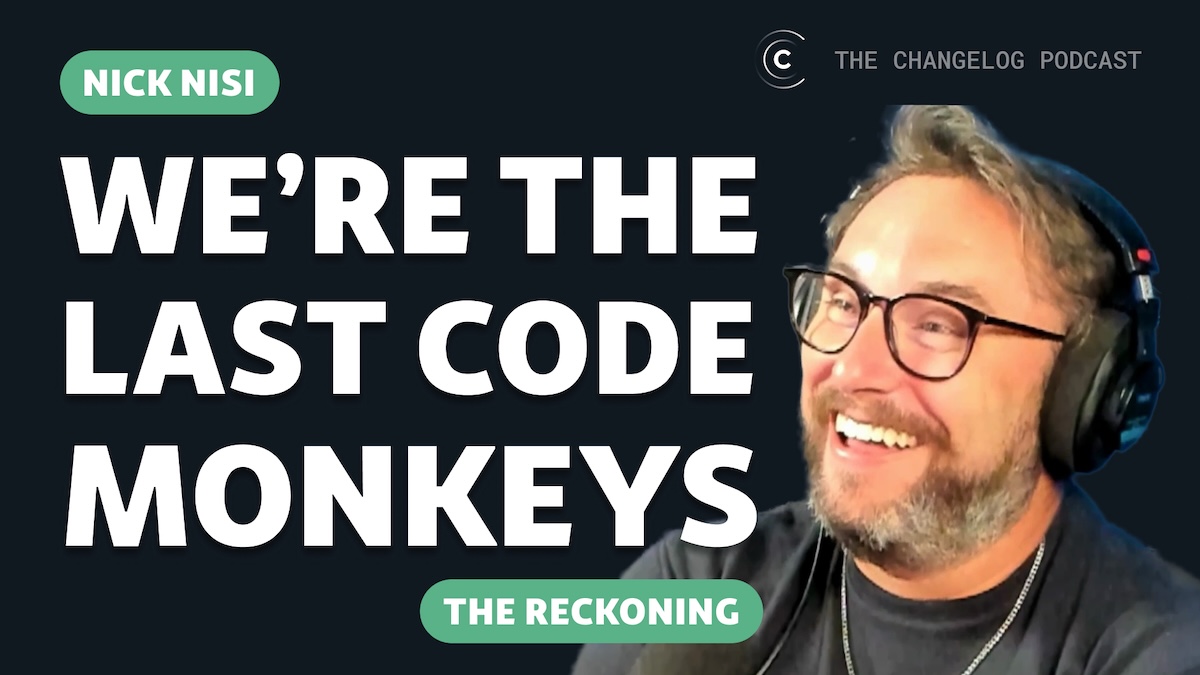Changelog News
Developer news worth a quick Colorado trip
Hey, hey! 👋
The mystery guest for Saturday’s Changelog LIVE show is a mystery no more! The amazing Nora Jones will be joining us on stage at The Oriental Theater for a “fireside” chat. Add that to a Breakmaster Cylinder musical performance, Kaizen 20 featuring our big Pipely launch, and a trail hike at Red Rocks… that’s a pretty nice little Saturday…
Ok, let’s get into this week’s news.
🎧 Pivoting to Retool
David Hsu from Retool joins Adam to discuss how he built Retool. From the pivot in YC, to building the most widely used internal tools platform, to now being the platform for AI agents in the enterprise—on this episode we cover David journey from YC to building agents for the enterprise. 🎥 VIDEO
🥵 Humanity has prevailed (for now!)
Last Wednesday, a Polish programmer (named Przemysław Dębiak) did what may soon be impossible: he beat an advanced AI model from OpenAI in a 10-hour head-to-head coding marathon.
The competition required contestants to solve a single complex optimization problem over 600 minutes. The contest echoes the American folk tale of John Henry, the steel-driving man who raced against a steam-powered drilling machine in the 1870s. Like Henry’s legendary battle against industrial automation, Dębiak’s victory represents a human expert pushing themselves to their physical limits to prove that human skill still matters in an age of advancing AI.
For his efforts, Dębiak won 500,000 yen (~3400 USD) and had the following to say on X:
Humanity has prevailed (for now!)
I’m completely exhausted. I figured, I had 10h of sleep in the last 3 days and I’m barely alive.
📈 Linux breaks 5% desktop share in U.S.
Is the year of the Linux desktop finally upon us?!
In a landmark shift for the computing landscape, Linux has finally crossed the 5% threshold in desktop market share within the United States, marking a pivotal moment for open-source software enthusiasts and industry observers alike… This surge reflects broader dissatisfaction with dominant players like Microsoft Windows and Apple macOS, driven by factors including privacy concerns, customization demands, and the rising cost of proprietary ecosystems.
According to the report, analysts are “eyeing 7% by 2027.” What a time to be alive!
🗄️ Make your own backup system
Stefano Marinelli is writing a series on making your own backup system, and if Part 1 is any indicator, it’s going to be an absolute banger. After describing his general philosophy around backups (data must always be restorable, in an open format, and consistent), Stefano helps us develop a plan:
Before touching a single file, you must start with a plan, and that plan starts with asking the right questions:
“How much risk am I willing to take? What data do I need to protect? What downtime can I tolerate in case of data loss? What type and amount of storage space do I have available?”
Click through if you want Stefano to help you with the core decision (full disk vs individual files), to read about the power of snapshots, and for him to weigh in on the age ol’ question: push or pull?
💰 Vibe code with confidence
Thanks to CodeRabbit for sponsoring Changelog News
You’ve heard of vibe coding –Letting intuition take the wheel, and writing code that feels right. But what about shipping that code? That’s where confidence tends to fade. This is where CodeRabbit’s AI Code Review platform and their IDE integration comes in, giving you a new way to code with vibes and guardrails.
CodeRabbit blends the freedom of your flow state with the confidence of continuous review. It reads your mind (okay, your code) and flags bugs, smells, missed tests, and hallucinations as you write. No context-switching. No guessing. Just real-time feedback baked into VS Code, Cursor, and Windsurf.
Learn more and start vibe coding with confidence at coderabbit.ai/ide
🐍 I’m switching to Python and actually liking it
Six months ago, César Soto Valero started coding in Python (because AI ) and was surprised by how much it has improved over the decades. He gives three examples:
- Python has created a very complete ecosystem of libraries and tools for processing and analyzing data.
- Python has gotten faster with optimized static compilers like Cython.
- Python has done a good job of hiding its legacy ugliness, sweetening its syntax to accommodate developers
In this post, César shares the tools, libraries, configs, and other integrations that bring him joy while building Python applications. Notably, he’s using uv as his package manager, which I’m hearing has largely solved one of Python’s biggest pain points: managing 3rd-party code.
Related: we’re having uv’s creator, Charlie Marsh, on the podcast in September.
🙄 It’s rude to show AI output to people
Alex Martsinovich says what we’ve all been thinking:
For the longest time, writing was more expensive than reading. If you encountered a body of written text, you could be sure that at the very least, a human spent some time writing it down. The text used to have an innate proof-of-thought, a basic token of humanity…
There’s nothing wrong with using AI. When you do, you know what you’re getting. The transaction is fully consensual. But whenever you propagate AI output, you’re at risk of intentionally or unintentionally legitimizing it with your good name, providing it with a fake proof-of-thought.
“I asked ChatGPT and this is what it said: …” is the new “I had the weirdest dream last night, it all started when …”
🎙️ Try harder. Ultrathink!
Nick Nisi joins us to discuss all the Windsurf drama, his new agentic lifestyle, whether or not he’s actually more productive, the new paper that says he maybe isn’t more productive, the reckoning he sees coming, and why we might be the last generation of code monkeys. 🎥 VIDEO
🕯️ Gaslight-driven development
Niki Prokopov:
Any person who has used a computer in the past ten years knows that doing meaningless tasks is just part of the experience. Millions of people create accounts, confirm emails, dismiss notifications, solve captchas, reject cookies, and accept terms and conditions—not because they particularly want to or even need to. They do it because that’s what the computer told them to do. Like it or not, we are already serving the machines.
Well, now there is a new way to serve our silicon overlords.
🧑🎓 Junior roles aren’t going away
Charlie Graham:
Having spent the last year deep in the AI-rena, building products with Claude Code/Cursor, using tools like Ideogram, Midjourney, and Creatify for content creation, and watching how my company’s needs have changed, I think this narrative is overplayed.
Junior roles aren’t going to die. They’re going to transform.
🎥 How to PURGE a global CDN in Elixir
One crucial stop on the roadmap toward our big Pipely launch is the ability to purge content from our Elixir app that publishes all of our shows. On this Make It Work episode, Gerhard and I sat down to pair program the feature.
📐 Don’t forget your (un)ordered list
- Rethinking CLI interfaces for AI
- Running TypeScript natively on Node.js
- How AI wreaked havoc on the lo-fi beat scene
- Crawling a billion web pages in just over 24 hours
- Choosing a database schema for polymorphic data
- MacPaint art from the mid-80s still looks great today
- Why I’m betting against AI agents in 2025 (despite building them)
- Google exec: ‘We’re going to be combining ChromeOS and Android’
- Kiro is an agentic IDE that works alongside you from prototype to prod
That’s the news for now, but we have some great episodes coming up this week:
- Wednesday: Sugu Sougoumarane on building Multigres
- Friday: We play #define with Changelog++ members
Have a great week, forward this to a friend who might dig it, and I’ll talk to you again real soon. 💚
–Jerod



